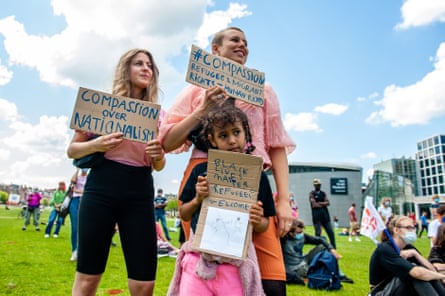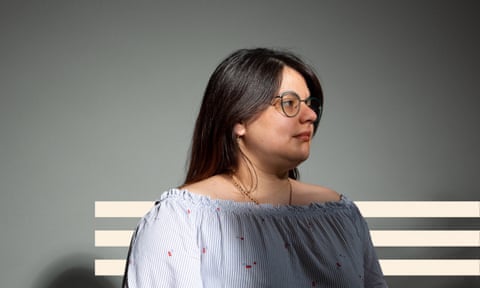It felt like a dirty trick. Natalia Robledo-Contreras still has trouble believing what happened the day she and her younger sister first applied for a Dutch residence permit. An immigration official refused to accept the girls’ applications until their parents came with them. Robledo-Contreras, then 17 years old, and her lawyer were suspicious. What if this was a ruse to detain her parents, who like the sisters were undocumented in the Netherlands?
But with the official refusing point blank to take their forms, her mother relented. She was detained immediately upon arrival. “I cried non-stop, even after my mum was released later that day,” Robledo-Contreras says. “She was ordered to leave the country immediately.”
Q&AWho are Europe's dreamers?
Show
Dreamers is the US term collectively given to young people without legal immigration status who were brought to the US as children. Some young people living in Europe without legal status now also call themselves 'dreamers' because their struggle against hostile European migration and asylum policies echoes the US campaign. Between 3.9 and 4.8 million people in Europe are believed to be living without residency permits, about 65% of whom are under 35 years old, according to the Pew Research Center. In the UK, a recent University of Wolverhampton study commissioned by the mayor of London estimated there are 332,000 children and young people living undocumented in the UK, including 106,000 children born in the country. Estimating numbers of undocumented people necessarily involves guesswork – and the methodologies are often criticised – but it is thought there are millions of dreamers across Europe.
That day in 2012 marked the beginning of Robledo-Contreras’s long quest for legal status in the Netherlands, a country where she had already lived for nine years. At every stage she would try to do the right thing and every effort to comply with the rules would be used against her. The process would ultimately cost Robledo-Contreras her family.
Her father left behind poverty and unemployment in Chile in 2001 after a relative helped him find a job in the Netherlands. But the job was off the books, so when a year later he brought his wife and two children to join him they also had no documents. As an eight-year-old, Robledo-Contreras had been reluctant to leave her home in Santiago. But she was a good girl, a trier who took responsibility. She excelled at school in the Netherlands.
The family had tried for legal residency in the Netherlands via several different routes, but did not qualify. A lawyer advised Robledo-Contreras’s family to wait at least four years for the children to develop roots in the country, through school and Dutch language classes, before applying for the sisters’ residence permits. “Getting good grades would be good for my case, we thought, as a family,” she says.
Robledo-Contreras, now a 25-year-old law student in Amsterdam, supports her studies by working as a cleaner but this has mostly dried up since the coronavirus pandemic broke out. But she recognises that others are even worse off: “Thousands of undocumented migrant domestic workers have also been let go by their clients.”
She speaks softly, but there is passion in her voice when she talks about the struggles of working without papers.
Activism runs in her family. Her mother protested against the Pinochet regime in Chile. “And my nanna is my big example,” she says. “She was in a women’s union for agricultural workers. I’m really proud of that.”
Yet her own family, the source of her inspiration, has been turned into the main obstacle to her dream of achieving legal residence. After her mother was detained in 2012, the Dutch immigration services used her parents’ undocumented status as a reason not to grant residence to Robledo-Contreras and her sister. Restrictive immigration policies such as those in the Netherlands can create perverse incentives for undocumented families. With the path to legal status made tough for the heads of families, authorities fear it incentivises migrants to first try to obtain residence permits for their children. The immigration service used the argument that Robledo-Contreras’s parents might benefit from her legal status to apply for family reunification.
“This is a standard argument used by Dutch immigration services against children in undocumented family cases,” said Robledo-Contreras’s immigration lawyer, Corinne de Klerk. Some families therefore isolate themselves from their children or deny they have contact, in order to strengthen their application. “I even know of a case where the parents pretended to have disappeared from the life of their child,” says De Klerk.
The UN children’s rights treaty says countries should not discriminate against children based on their parents and that the best interests of children should be the primary consideration in immigration cases. Dutch opposition parties have proposed a bill to adopt this article into Dutch law.

While there are few reliable estimates of the number of undocumented people in the Netherlands, a study in 2013 put the population at 35,530. In 2016, a survey by a medical aid organisation in Amsterdam found about 15% of its patients had undocumented children.
Since April, the Dutch centre-right liberal coalition government, led by Mark Rutte, has been under pressure from public protests to take in unaccompanied children from refugee camps on the Greek islands.
But Dutch rightwing policians, including Geert Wilders and Thierry Baudet, have long demanded hardline migration curbs and Rutte’s government is accused of pandering to the anti-migration message.
Despite her never-ending uncertainty, Robledo-Contreras graduated near the top of her high-school class. She took her school reports to meetings with the immigration services. “All these good grades and my Dutch language classes were to show my integration into Dutch society,” she says. “But the officials used them against me. They told me that I was smart enough to adapt to a life in Chile.”
In one meeting they told her she was not integrated enough, and in the next that she was too integrated.
She was also required to “cooperate with her return” in order to apply for a permit. “They asked us to buy flights to Chile, to watch a Dutch reality television programme about people living a good life in Chile,” she says. This process often scares people into dropping legal procedures, according to De Klerk. “They pressure you to leave,” Robledo-Contreras says, with a sigh. “After a while you don’t know what to do any more to help your case.”
After five years of battling the system, Robledo-Contreras lost an appeal in her case for a residence permit in 2017 and received an entry ban. From that moment, she was living illegally in the Netherlands.
“I lost everything. I couldn’t even dream about a future for myself any more,” she says. The situation took a toll on her family. “You become unhappier over time and feel like blaming something for it. I started to blame my father for his decision to go to the Netherlands. I began to ignore him.” She looks at the ground, searching for the right words. “It’s the entire situation that slowly pushes you apart, into a position where you consider it might be better to cut the cord with each other.”
The country of her birth had become a foreign idea. “Slowly Chile became further away for me. I grew attached to the Netherlands, mainly because I knew nothing else,” she says. She started working as a cleaner and joined the migrant domestic workers’ board of a Dutch trade union. “I didn’t want to be undocumented and do nothing for society.”
Her sister, who has mental health issues, was still involved in her own residency application. Robledo-Contreras had also struggled with her mental health. “I couldn’t break down,” she says of her childhood. “My parents were working at least six days a week. Two ill daughters would be too much to handle for my family. Instead, I hid behind my school books.”
After two years living without papers, Robledo-Contreras’s lawyer suggested adding her to her sister’s case, a common approach when one sibling’s case is stronger. She started the residency process again, terrified by the memories of her mother’s detention when they first applied. “Now it was me at serious risk of being deported immediately,” she says. She had a panic attack and went to see a psychologist, but was not able to access treatment due to her immigration status.
In her last appeal in January 2019, she brought all the evidence she had to prove her ties to the Netherlands and show she was entitled to remain. In the end, the broken relationship with her parents became a decisive point in the case, as the authorities could no longer claim her parents would benefit from her status. Three months later, she and her sister received residence permits, 17 years after arriving in the Netherlands.
“I can enjoy my life now,” she says. She continues to work with the migrant domestic workers network and campaign for better rights for undocumented workers, most recently those who have lost their incomes because of the pandemic. She has also enrolled on an undergraduate degree and hopes to qualify as a lawyer in three years. “When I’m walking to my university, I think: I’ve been wanting this for so long,” she says. “But this is followed by sad memories of everything that it cost.”
The relationship with her parents remains strained. “We’re mending it now,” she says. “It’s much needed.” Asked how her parents see her today, she says: “They are proud of me. I think they are the most proud of the fact I’ve always continued to do things. That I didn’t break down.”
This article is part of a week-long Guardian series called ‘Europe’s dreamers’, which tells the stories of undocumented young people in a climate of hardline European migration policies.
